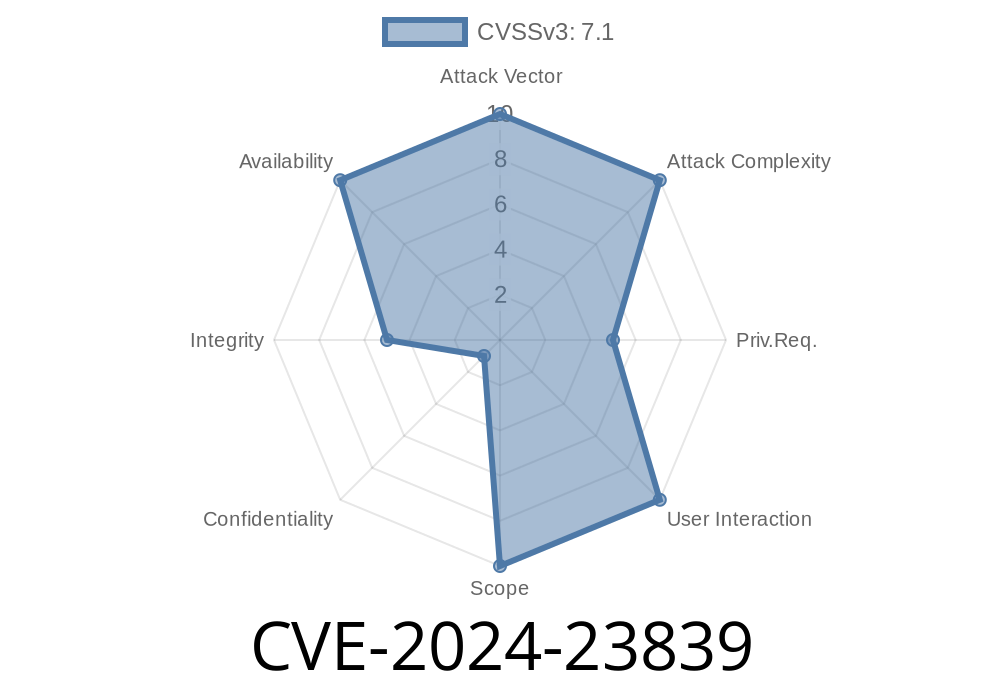Suricata is widely respected as an open-source Network Intrusion Detection System (NIDS), Intrusion Prevention System (IPS), and Network Security Monitoring (NSM) solution. It plays a vital role in network security for organizations and individuals alike.
This post will detail CVE-2024-23839—a vulnerability uncovered in Suricata versions prior to 7..3—which enables attackers to trigger a heap use-after-free with specially crafted HTTP traffic. The bug mainly affects configurations using the http.request_header or http.response_header rule keywords. I’ll walk you through the details, show what exploitation looks like, and provide defense recommendations.
Suricata Background
Suricata, maintained by the Open Information Security Foundation (OISF), inspects network traffic against a comprehensive rule set to detect malicious activity. Its HTTP parser can filter traffic based on headers using rules like:
alert http any any -> any any (msg:"User-Agent detected"; http.request_header; content:"User-Agent:"; sid:1;)
What is CVE-2024-23839?
- CVE-2024-23839 is a heap use-after-free bug discovered in how Suricata parses HTTP headers when certain rules are loaded.
- A malicious actor can craft traffic that triggers the flaw, which could crash Suricata or potentially allow remote code execution (RCE), depending on memory layout.
Who Is Affected?
If you run Suricata older than 7..3 and your rule set contains either http.request_header or http.response_header, you are vulnerable.
How Does the Exploit Work?
The vulnerability lies in Suricata's mismanagement of memory when parsing HTTP headers according to specific rule keywords. When a matching HTTP request or response is parsed, Suricata allocates a structure to store header data; but, with carefully crafted sequences, memory can be freed too early and accessed again (use-after-free).
Cause program crashes,
- Potentially execute arbitrary code if other conditions are met (though just crashing and causing DoS is easier and more likely).
Let’s say your Suricata rule set contains
alert http any any -> any any (msg:"Suspicious Header"; http.request_header; content:"evil:"; sid:100001;)
An attacker sends
GET / HTTP/1.1
Evil: something
Host: vulnerable.com
But to exploit the bug, the malicious payload must be specially crafted—not just matching the content. For example, manipulating chunked HTTP requests or malformed headers forces Suricata’s parser to mishandle its memory.
Though weaponization details are not public, here's a simplified logic
# Simulate sending malformed HTTP headers to a Suricata sensor
import socket
payload = (
b"GET / HTTP/1.1\r\n"
b"Host: victim\r\n"
b"X-HTTP-Exploit: x"*100 + b"\r\n"
b"\r\n"
)
s = socket.create_connection(('SURICATA_SENSOR_IP', 80))
s.sendall(payload)
s.close()
*(Replace SURICATA_SENSOR_IP with the real IP.)*
If Suricata receives enough malformed data, it will crash with a memory error if rule sets with http.request_header exist.
Suricata may log segmentation faults, or crash logs like
* Error in `suricata': double free or corruption (!prev): x00007f8bc4001ce *
Or similar messages indicating heap corruption.
Look for rules using http.request_header or http.response_header
grep -E 'http\.(request|response)_header' /etc/suricata/rules/*.rules
### How to Fix / Work Around
Best Solution:
Upgrade Suricata to 7..3 or later.
Release announcement and changelog
Workaround:
If you cannot upgrade, comment out or remove rules that use the vulnerable keywords.
Example
- alert http any any -> any any (msg:"User-Agent detected"; http.request_header; content:"User-Agent:"; sid:1;)
+ # Disabled due to CVE-2024-23839
References
- Suricata Security Advisory
- CVE-2024-23839 at NVD
- Suricata GitHub Release 7..3
Conclusion
CVE-2024-23839 is a serious flaw that can crash or compromise Suricata installations prior to 7..3 if your rules inspect HTTP headers with certain keywords.
Patch your systems, or disable the vulnerable rules, as soon as possible to protect your network monitoring.
Stay safe. If you found this post helpful, share it with your fellow network defenders or IT admins.
Let’s keep the blue team ahead!
*Written exclusively for you, with clear examples and actionable steps.*
Timeline
Published on: 02/26/2024 16:27:58 UTC
Last modified on: 03/07/2024 03:15:07 UTC
